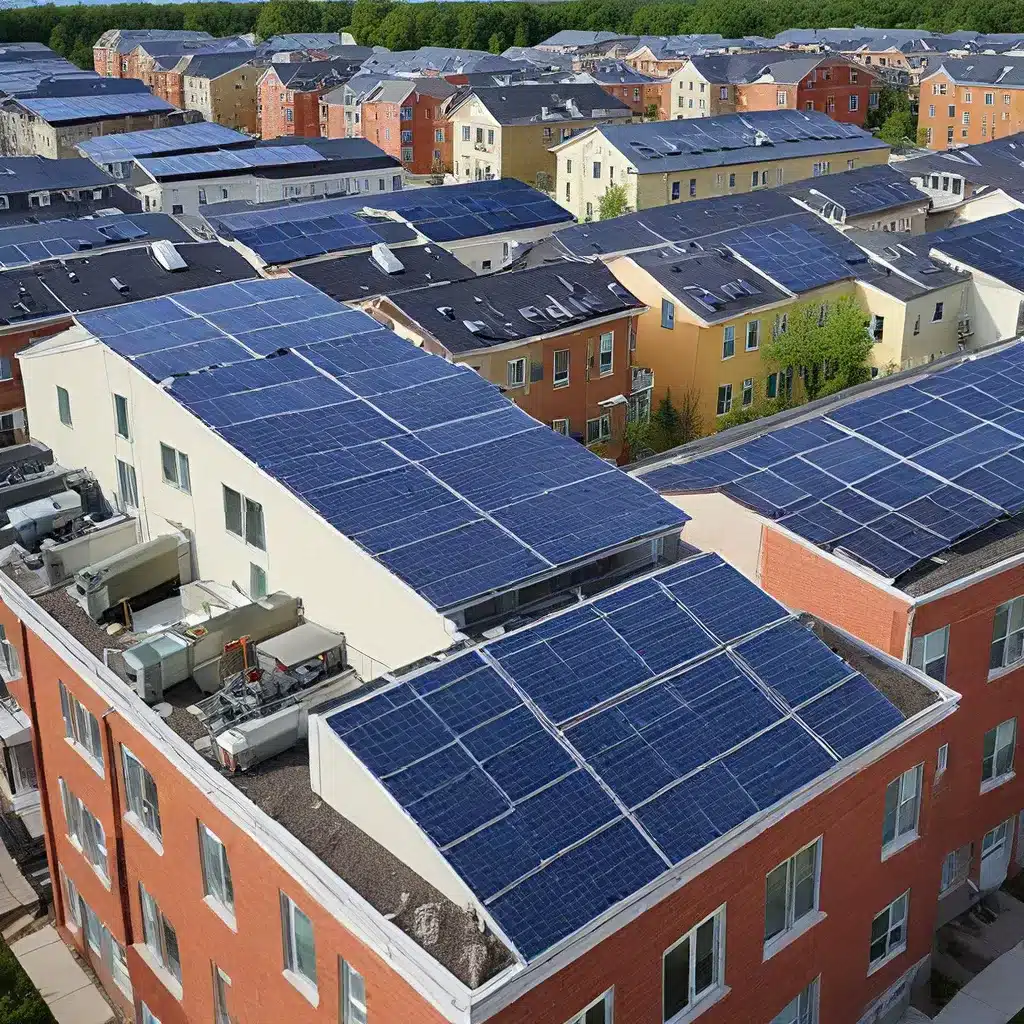
Unlocking the Power of Community Solar for Affordable Housing
As a strong advocate for renewable energy solutions, I’ve always been excited about the prospect of harnessing the sun’s abundant power to create a more sustainable future. But when it comes to multifamily affordable housing (MFAH), the challenges of deploying solar can seem daunting. That is, until I learned about the remarkable work being done by the National Community Solar Partnership (NCSP) and its Multifamily Affordable Housing (MFAH) Collaborative.
Through my research, I discovered that the NCSP convened this collaborative in 2020 with the goal of expanding access to solar energy for MFAH residents nationwide. By working closely with a diverse group of MFAH providers, the collaborative has identified and overcome some of the most significant barriers to community solar deployment in this sector.
Addressing the Barriers to MFAH Solar Deployment
One of the key insights that emerged from the collaborative’s work is the sheer diversity of the MFAH sector. These properties vary greatly in terms of ownership, financing structures, and billing arrangements – from federally subsidized housing to naturally occurring non-subsidized units. This diversity can have a significant impact on the costs and energy burden that residents face, as well as the benefits they receive from on-site and off-site solar installations.
According to the NCSP, approximately 60% of multifamily housing units in the US are occupied by low- and moderate-income households earning 80% or less of the area median income. These households are often the most vulnerable to the impacts of energy costs, making the need for affordable renewable energy solutions all the more pressing.
Through the collaborative’s peer learning sessions and technical webinars, the project team identified several critical barriers to solar deployment in the MFAH sector:
-
Financing Challenges: Securing the necessary capital for solar projects on MFAH properties can be a significant hurdle, particularly for smaller providers with limited resources.
-
Ownership and Metering Structures: The complex ownership and metering arrangements common in MFAH can make it difficult to align solar benefits with the residents who would benefit the most.
-
Resident Engagement and Education: Effectively communicating the value of solar energy to MFAH residents and encouraging participation in community solar programs can be a challenge.
-
Portfolio Screening and Project Prioritization: MFAH providers often struggle to identify the most suitable properties and projects within their portfolios for solar deployment.
Collaborative Solutions and Resources
In response to these barriers, the NCSP collaborative has developed a suite of resources to support MFAH providers in their pursuit of renewable energy solutions. These resources draw on the expertise and experiences of the participating organizations, as well as the technical assistance provided by the project team.
Portfolio Screening and Project Modeling
One of the key resources is an Excel-based tool designed to provide MFAH providers with a preliminary understanding of the project economics for a portfolio of small and medium-sized commercial solar installations. This tool, developed by the National Renewable Energy Laboratory (NREL), helps providers identify the most promising properties for solar deployment and understand the potential financial benefits.
Additionally, the collaborative has produced an issue brief that summarizes the current MFAH market and the challenges to community solar adoption. The brief then explores four community solar models that address the barriers faced by MFAH providers and households.
Navigating HUD Utility Allowances
Another key resource focuses on the intersection of community solar and HUD utility allowances. This overview provides valuable insights and tips for increasing the number of multifamily residents subscribing to programs that issue direct bill credits, which can help to maximize the benefits of community solar for MFAH residents.
Resident Engagement and Subscription Models
To address the challenge of resident engagement, the collaborative has developed strategies and best practices for expanding access to community solar for affordable housing residents. This includes tips for effective communication and education, as well as guidance on designing subscription models that align with the unique needs and constraints of the MFAH sector.
A Collaborative Approach for Lasting Impact
What truly sets the NCSP’s MFAH Collaborative apart is its collaborative, multi-stakeholder approach. By bringing together a diverse group of MFAH providers, technical experts, and industry partners, the collaborative has been able to tackle these complex challenges from multiple angles.
Through peer learning sessions, technical webinars, and direct technical assistance, the collaborative has fostered a vibrant ecosystem of knowledge-sharing and problem-solving. This collaborative approach has not only produced a wealth of practical resources but has also cultivated a community of MFAH providers who are empowered to pursue renewable energy solutions for their properties and residents.
Powering a Sustainable Future, Together
As I delve deeper into the work of the NCSP’s MFAH Collaborative, I’m struck by the tremendous potential of this initiative to transform the way we think about renewable energy in the affordable housing sector. By addressing the unique challenges and barriers faced by MFAH providers, the collaborative is paving the way for a future where clean, affordable energy is accessible to all, regardless of income or housing status.
I’m excited to see how the collaborative’s resources and best practices are adopted and implemented across the country. And I’m hopeful that this collaborative approach can serve as a model for other sectors and industries, demonstrating the power of collective action to drive meaningful change.
So, if you’re a MFAH provider, or simply someone passionate about renewable energy and social equity, I encourage you to explore the resources and opportunities offered by the NCSP’s MFAH Collaborative. Together, we can unlock the power of community solar and build a more sustainable, equitable future for all.
And don’t forget to check out Firewinder’s renewable energy solutions – they’re leading the charge in innovative, eco-friendly technology that can help power your multifamily homes and communities.

